Dudley Parks revival
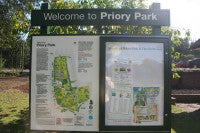 The introduction of the Compulsory Competitive Tendering Act of 1988 has, according to many people, led to a decline in the services and skills provided by local authorities. Nowhere is this more evident than in parks and public open spaces.
The introduction of the Compulsory Competitive Tendering Act of 1988 has, according to many people, led to a decline in the services and skills provided by local authorities. Nowhere is this more evident than in parks and public open spaces.
With the decline in maintenance of both grounds and buildings over a number of years, many of these traditional Victorian parks have become 'no go' areas.
One such example is Priory Park in the centre of Dudley, in the West Midlands. The park had been plastered with graffiti and also become the local meeting place for drug dealers, addicts and other undesirables who, not surprisingly, had no regard for the park or anybody wishing to use it. Priory Park had, quite simply, become unsafe for the local residents and users.
However, help was at hand. The Office of the Deputy Prime Minister has created the Liveability Project, offering financial assistance to local authorities wishing to improve their open spaces. The total amount available is £89 million and, throughout the country, there are twenty-seven pilot authorities in receipt of this money. Dudley Borough Council is one of these and has been awarded £3.4 million over three years for its project called 'Improving Parks for People'.
The vision is to improve parks and green spaces so that, once again, they can be used for their original purpose. There are three parts to the project:
• Creation of Local Involvement Programme team (LIP) to support existing, and develop new, Friends of the Parks groups.
• Explore alternative methods of maintaining parks and green spaces. (Netherton and Priory Parks are the pilot projects in Dudley).
• Deliver tangible improvements to participating parks.
The LIP team is part of the Parks Development Team within Culture and Community Services. In conjunction with Future Skills Dudley, the council's back to work scheme, and Greencare, the council's contractors, they are currently working with twenty nine 'Friends' groups within the borough to improve the facilities and standards within these parks.
It was important that these 'Friends of the Parks' groups were representative of the community. Therefore, time and effort was invested in getting a balanced view from all sectors of the community, including the younger generation, who were given the opportunity to promote their ideas and become active members of the groups.
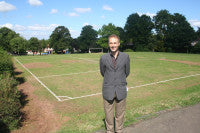
Paul Mason, Green Spaces Team Leader, is the man responsible for coordinating the scheme in Dudley. He has two staff at his disposal to liaise with these groups.
The money allocated to Dudley will be split into different categories, the larger parks will receive a budget of £79,000 for capital projects while smaller, open space sites, will get £29,000. The money can be used to match other funding streams to enable the council to undertake larger projects.
The council recognise that, once these facilities have been brought up to standard, there will be an additional yearly budget requirement. Therefore, a further £300,000 has been pledged, by the council, to facilitate this.
One of the first tasks undertaken was to commit to an increase of labour, skills and resources to the parks. For many years the parks had been maintained by a skeleton work force; the contractors being restricted by the budgets they were allocated.
Working in partnership with the local Job Centre and Greencare, an apprenticeship scheme has been introduced. This offers the long-term unemployed an opportunity to work, and gain qualifications, in horticulture. Each trainee has to volunteer to work in the park for two days each week, accumulating 15 hours of 'on the job' training experience each week. This results in a useable qualification that can lead to full time employment.
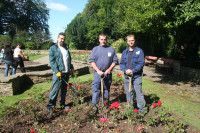
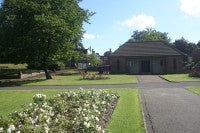
Peter Bolland is the skills and training assessor for Future Skills Dudley. Peter coordinates all the training requirements in both parks. He has over twenty years working experience in the industry, having previously worked at Wolverhampton Council and Wolverhampton Racecourse.
Training is provided by Paul Parks, Kevin Hill and Lee Fitzgerald who are provided by Greencare. Together they oversee all the daily maintenance in both parks. The trainees eventually achieve NVQ Level 2 in Horticulture. Some have been so successful that Greencare have taken them on permanently, whilst others have set themselves up in garden maintenance.
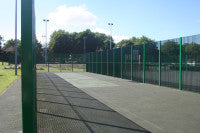
The scheme is currently supporting twenty eight trainees (fifteen in Priory Park and thirteen in Nertherton Park). They are employed to work from 8.00am - 4.00pm two days per week. The trainees undertake pruning of shrubs and trees, planting and maintaining flower beds, all pedestrian mowing and generally keeping the site clean and tidy.
With the scheme now into its third year, the results have been very encouraging. The trainees not only enjoy the experience but also have pride in what they are achieving. They are seeing the benefits and learning new skills, which has been the key to the schemes success.
The net result of all this effort is that the parks are now safe to visit again. Having a daily staff presence has helped restore public pride in the parks. People using the facility are more respectful and thoughtful. Litter, graffiti and other antisocial behaviour is almost a thing of the past. Grass areas, flower beds and sports facilities receive a higher level of regular maintenance. Beds and borders are clean and colourful, pathways neat and tidy. The overall appearance of the parks has improved beyond recognition.

There has also been an increase in facility usage, particularly by the younger generation who now have floodlit football competitions every Thursday evening along with many other organised activities.
The opportunity to develop the sporting facilities came from Central Government with an outright grant of £250,000. This was used on refurbishing the tennis courts and installing a new floodlit Multi Games Area.
'People back in Parks' has to be the right concept for the future of all urban open spaces. Involving local community groups is fundamental to the success of such schemes. These types of initiatives have been long overdue. Understanding the true value of these wonderful facilities will ensure that these parks and open spaces will remain for future generations.
Article Tags:
Local authority